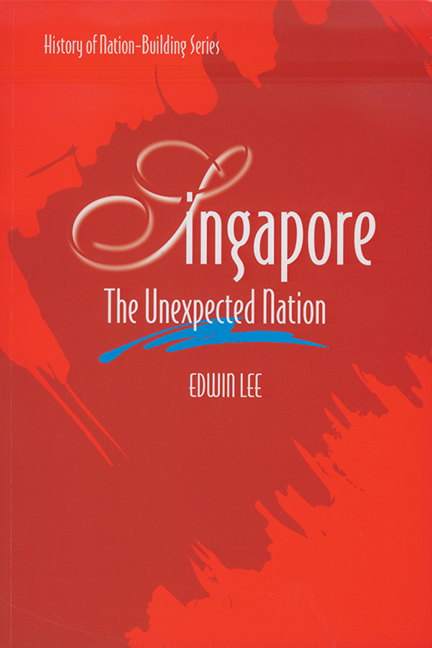Book contents
- Frontmatter
- Dedication
- Contents
- Preface
- Introduction by Wang Gungwu
- Chapter One Beginnings: From Temasek to Singapore
- Chapter Two Race, History and Nationalism
- Chapter Three Contestants and Contesting Visions
- Chapter Four The Accidental Chief Minister
- Chapter Five The Terminal Chief Minister
- Chapter Six The Embattled Prime Minister
- Chapter Seven Merger: Contesting Ownership and Principles
- Chapter Eight Terms of Disendearment
- Chapter Nine Dare to be Equal
- Chapter Ten The Way to Survive
- Chapter Eleven National Service: The Price of Independence
- Chapter Twelve Politics of Education
- Chapter Thirteen Home Ownership, National Stability and the New Middle Classes
- Chapter Fourteen University and Nation
- Chapter Fifteen Toh's Nation-Building Thrust
- Chapter Sixteen Nantah: Between Community and Nation
- Chapter Seventeen Self-Renewal: Talents for a Tough Act
- Chapter Eighteen The Consensual Prime Minister
- Chapter Nineteen Confucianism, Christianity, Chineseness
- Chapter Twenty Singapore Dreams, Singapore Dilemmas
- Chapter Twenty-One The Hyphenated Singaporean
- Chapter Twenty-Two The Unexpected Nation
- Bibliographical Note
- Index
- The Author
Chapter Twelve - Politics of Education
Published online by Cambridge University Press: 21 October 2015
- Frontmatter
- Dedication
- Contents
- Preface
- Introduction by Wang Gungwu
- Chapter One Beginnings: From Temasek to Singapore
- Chapter Two Race, History and Nationalism
- Chapter Three Contestants and Contesting Visions
- Chapter Four The Accidental Chief Minister
- Chapter Five The Terminal Chief Minister
- Chapter Six The Embattled Prime Minister
- Chapter Seven Merger: Contesting Ownership and Principles
- Chapter Eight Terms of Disendearment
- Chapter Nine Dare to be Equal
- Chapter Ten The Way to Survive
- Chapter Eleven National Service: The Price of Independence
- Chapter Twelve Politics of Education
- Chapter Thirteen Home Ownership, National Stability and the New Middle Classes
- Chapter Fourteen University and Nation
- Chapter Fifteen Toh's Nation-Building Thrust
- Chapter Sixteen Nantah: Between Community and Nation
- Chapter Seventeen Self-Renewal: Talents for a Tough Act
- Chapter Eighteen The Consensual Prime Minister
- Chapter Nineteen Confucianism, Christianity, Chineseness
- Chapter Twenty Singapore Dreams, Singapore Dilemmas
- Chapter Twenty-One The Hyphenated Singaporean
- Chapter Twenty-Two The Unexpected Nation
- Bibliographical Note
- Index
- The Author
Summary
The economy, the army, and now education, were important pillars of nation-building under PAP rule. As democratic socialists, PAP leaders believed in education as a social good, and sought to bring it to as many as possible through promoting universal primary education and the expansion of secondary education. But the PAP Government did not begin on a clean slate. It had to deal with the system it inherited as a colonial legacy. At the same time, it had to carry out its own objectives. What it inherited were schools in four different languages, together with their attitudes, and in the case of Chinese-medium schools, entrenched suspicions and resistance to governmental interference. What it sought to create, with new principles in mind, was an education system that was responsive to the demands of industrial and business growth and modernization, and supportive of multiracial national integration. The pursuit of these objectives and principles brought in train consequences which were predictable to some extent, but the scale of these consequences, and the magnitude of the impact on key constituencies were not, and were overwhelming like a river at full flood.
Once in power in 1959, the PAP endorsed the 1955 All-Party Committee Report on Chinese education, which laid down the principle of equal treatment for the four streams of schools, English, Chinese, Malay, and Tamil, in existence in the then British colony. This principle, as applied to Chinese-medium schools, meant that the school buildings and resources were upgraded, the teachers received training at the Teachers' Training College for the first time, several Chinese teachers' unions gained recognition, and the Ministry of Education started to appoint officials knowledgeable about Chinese education.
The PAP Government also carried out the All-Party recommendation that the four streams of schools should use textbooks with a common content, but written in their respective languages. In 1960, it introduced a common examination at the primary level, the Primary School Leaving Examination, sat for by students of all four streams of schools.
At the secondary level, the Chinese Middle Schools were restructured on the lines of the English-medium secondary schools, amid much controversy.
- Type
- Chapter
- Information
- SingaporeThe Unexpected Nation, pp. 295 - 322Publisher: ISEAS–Yusof Ishak InstitutePrint publication year: 2008

